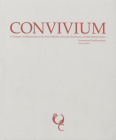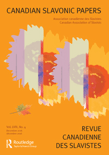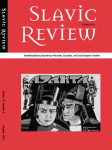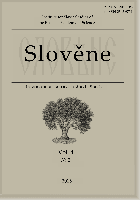
Studia Slavica et Balcanica Petropolitana
Scope & Guideline
Advancing Interdisciplinary Insights into Slavic and Balkan Studies
Introduction
Aims and Scopes
- Cultural History and Heritage Studies:
The journal emphasizes the examination of cultural artifacts, historical narratives, and the evolution of traditions within Slavic and Balkan societies, reflecting on their significance in contemporary contexts. - Interdisciplinary Approaches:
Utilizing methodologies from history, anthropology, art history, and literary studies, the journal encourages a holistic understanding of the subjects it covers, fostering dialogue between different academic disciplines. - Focus on Religious and Ideological Constructs:
Many papers delve into the religious influences and ideological developments in Eastern Europe, particularly the role of Orthodoxy and its impact on national identities and cultural expressions. - Exploration of Ethnic and National Identities:
The journal addresses themes of ethnicity and nationalism, particularly how these constructs have shaped historical narratives and cultural expressions in Slavic and Balkan contexts. - Historical Revisionism and Source Analysis:
There is a consistent focus on revising historical interpretations and analyzing primary sources to uncover new insights into the past, particularly regarding medieval and early modern periods.
Trending and Emerging
- Cultural Memory and Identity:
There is a growing trend towards exploring concepts of cultural memory and identity, particularly how historical narratives shape contemporary national and ethnic identities in Slavic and Balkan regions. - Artistic Representations and Interpretations:
Recent articles increasingly focus on the analysis of art and aesthetics, examining how visual culture reflects and constructs historical narratives and social ideologies. - Intercultural Exchange and Interaction:
Emerging themes highlight the significance of intercultural exchanges, particularly in contexts of migration and diaspora, reflecting on how these interactions influence cultural identities. - Religious Dynamics and Conflicts:
The study of religious dynamics, particularly the interplay between Orthodox Christianity and other faiths, is gaining traction, reflecting current sociopolitical climates in the region. - Revisiting Historical Figures and Events:
There is an increasing interest in revisiting and reinterpreting notable historical figures and events, suggesting a shift towards critical engagement with established historical narratives.
Declining or Waning
- Military History Focus:
While military history was once a prominent theme, recent publications suggest a waning interest in this area, with fewer articles dedicated to military campaigns or tactics compared to previous years. - Soviet Era Studies:
The exploration of Soviet-era history and historiography has seen a decline, possibly due to a shift towards more contemporary issues or a broader focus on pre-Soviet cultural heritage. - Ethnographic Studies:
Papers focusing on ethnographic studies of specific Slavic or Balkan groups are less frequent, indicating a potential shift towards more generalized cultural or historical analyses. - Local Historical Narratives:
There seems to be a reduction in articles dedicated to very localized historical narratives, suggesting a trend towards broader thematic explorations that encompass larger regional or national contexts.
Similar Journals

Convivium-Exchanges and Interactions in the Arts of Medieval Europe Byzantium and the Mediterranean
Unveiling Cultural Connections Across Time and SpaceConvivium - Exchanges and Interactions in the Arts of Medieval Europe Byzantium and the Mediterranean, published by Masarykova University, is a dedicated platform for scholarly discourse in the fields of Classics, History, and the Visual Arts and Performing Arts. Since its inception in 2017, this journal has aimed to enrich our understanding of the intricate cultural interconnections between medieval Europe, Byzantium, and the Mediterranean region, standing as an important resource for researchers, professionals, and students alike. While the journal is published in an open-access format, enabling wider dissemination of knowledge, it currently holds a respectable Q3 quartile ranking across its categories in 2023, reflecting its increasing reputation in the academic community. Although the journal is based in Belgium, its scholarly reach is truly international, as evidenced by its varied contributions. Engage with Convivium to explore the rich tapestry of medieval art and thought, and contribute to the ongoing dialogue about our shared cultural heritage.

Canadian Slavonic Papers
Cultivating Understanding in Linguistics and LiteratureCanadian Slavonic Papers, published by Routledge Journals, Taylor & Francis Ltd, is an esteemed peer-reviewed journal dedicated to the exploration of the Slavic, Eastern European, and Russian domains, fostering scholarly dialogue across multiple disciplines. With a robust focus on Cultural Studies, History, Linguistics, and Literature, this journal has firmly established its presence in the academic community, as evidenced by its Q1 ranking across various categories in 2023. Since its inception, Canadian Slavonic Papers has been a vital platform for researchers, professionals, and students alike, providing an invaluable repository of knowledge and insights from 1977 to the present. While not an open-access journal, it remains accessible through institutional subscriptions, ensuring a wide dissemination of scholarship. Located in the United Kingdom, the journal continues to contribute significantly to the understanding of Slavic studies within a global context, making it essential reading for anyone invested in this dynamic field.

Konstantinove Listy-Constantines Letters
Elevating the study of history, philosophy, and religion to new heights.Konstantinove Listy - Constantines Letters is a premier academic journal published by the Constantine Philosopher University in Nitra, Slovakia. With a focus on the interdisciplinary exploration of historical, philosophical, and religious studies, this journal has established itself as a significant platform for scholarly discourse since its inception in 2015. The journal's impressive rankings—Q1 in History and Religious Studies, along with Q2 in Philosophy—demonstrate its commitment to high-quality research, concurrent with its strong performance in Scopus rankings, placing it in the 80th percentile for both Religious Studies and History disciplines. As an integral part of the academic landscape, Konstantinove Listy invites researchers, professionals, and students alike to contribute to its mission of advancing knowledge and understanding in these vital fields. While the journal operates under traditional publishing, it is recognized for its accessibility and contribution to fostering a vibrant scholarly community.

East Central Europe
Exploring the Rich Tapestry of East Central EuropeEast Central Europe is a prestigious scholarly journal published by BRILL that focuses on the intricate historical and cultural landscapes of the East Central European region. Established in 1975, this journal has become a pivotal platform for scholars, professionals, and students engaged in the fields of Cultural Studies, History, and Sociology and Political Science. With its comprehensive scope that spans significant historical periods and contemporary issues, East Central Europe aims to foster a deeper understanding of the socio-political dynamics and cultural developments that define this diverse area. Although not open access, the journal maintains a respectable impact within its category, ranking Q3 in both Cultural Studies and History, highlighting its relevance and reach within the academic community. Researchers interested in deepening their insights into regional studies will find this journal an invaluable resource, reflecting its solid position within the academic hierarchy, as evidenced by its ranking in Scopus. Further information and submission details can be accessed through BRILL's official website.

SLAVIC REVIEW
Unveiling the Richness of Slavic Studies.SLAVIC REVIEW, published by Cambridge University Press, is a prominent academic journal that delves into the rich tapestry of Slavic studies, focusing on the cultural, historical, and social dimensions of Slavic regions. With an ISSN of 0037-6779 and an E-ISSN of 2325-7784, this journal holds a significant position within the academic community, ranking in the Q2 category of Arts and Humanities (miscellaneous) and achieving a Q1 rating in Cultural Studies as of 2023. Notably, the journal has consistent relevance in the field, as evidenced by its Scopus rankings—Rank #260 in Cultural Studies and Rank #204 in Miscellaneous Arts and Humanities. Since its converged years starting from 1966 up to the present, SLAVIC REVIEW has been an essential resource for researchers, professionals, and students aiming to deepen their understanding of Slavic cultures. While it operates on a traditional subscription model and does not provide open access, the journal remains a vital platform for pioneering research and critical discourse in Slavic studies.

Slovo
Navigating the Dynamic Landscapes of Slavic ScholarshipSlovo, published by the University College London, School of Slavonic & East European Studies, is a vital scholarly journal dedicated to the exploration of Slavic languages and cultures, as well as the broader social sciences and humanities. Established with a commitment to advancing academic discourse, Slovo serves as a platform for researchers, professionals, and students interested in the dynamic intersections of literature, history, and cultural studies within Slavic and Eastern European contexts. Although it holds a Q4 ranking in both the Arts and Humanities and Social Sciences categories, the journal’s emphasis on fresh perspectives often invites innovative contributions that challenge conventional narratives. While lacking an Open Access option, Slovo remains integral for those seeking to navigate its multifaceted terrain, ensuring that emerging scholars and established academics alike can engage with rigorous research from 2012 to 2023 and beyond. With its headquarters in London, United Kingdom, this journal not only reflects the rich heritage of its academic lineage but also fosters a vibrant community committed to the exploration of Slavic and East European studies.

Imafronte-Revista de Historia del Arte
Bridging Disciplines in Art Historical InquiryImafronte-Revista de Historia del Arte is a premier scholarly journal published by the University of Murcia, dedicated to advancing the field of art history. With an ISSN of 0213-392X and an E-ISSN of 1989-4562, this open-access journal has been serving the academic community since 1985, ensuring that research is widely available and accessible. Nestled in the heart of Spain at the Campus de Espinardo in Murcia, Imafronte invites contributions that span a myriad of topics within art history, providing a rich platform for critical analysis and interdisciplinary dialogue. Its commitment to fostering scholarly communication and innovation makes it an essential resource for researchers, professionals, and students alike, eager to explore the nuances of artistic heritage and contemporary discourse in the arts.

Slovene-International Journal of Slavic Studies
Connecting Cultures Through Scholarly ExchangeThe Slovene-International Journal of Slavic Studies, published by the Russian Academy of Sciences, Institute of Slavic Studies, serves as a vital platform for scholarly discourse in the fields of Cultural Studies, History, Linguistics, and Religious Studies. Since its transition to Open Access in 2012, the journal has enriched academic dialogue, enabling wider circulation and accessibility of research findings. Based in the Russian Federation, the journal supports interdisciplinary approaches, inviting contributions that push the boundaries of traditional Slavic studies. With a commendable ranking in the Q3 quartile across multiple categories as of 2023 and respectable Scopus rankings, it stands out as a crucial resource for researchers and students alike, enhancing their understanding of Slavic and related cultural contexts. The journal's commitment to fostering international collaboration and dialogue positions it as an invaluable asset for anyone engaged in the complexities of Slavic studies.

Quiroga-Revista de Patrimonio Iberoamericano
Celebrating Ibero-American Heritage Through Innovative ResearchQuiroga-Revista de Patrimonio Iberoamericano, published by UNIV GRANADA, is a distinguished open-access journal dedicated to the fields of conservation, museology, and the visual and performing arts. Since its inception in 2012, the journal has provided a platform for scholars and practitioners to disseminate innovative research and critical discussions pertinent to Ibero-American heritage. With a growing impact, evidenced by its category quartiles ranking—Q3 in Conservation and Q2 in both Museology and Visual Arts and Performing Arts—as well as its Scopus rankings, Quiroga serves as an essential resource for researchers, professionals, and students who engage with the complexities of cultural preservation and artistic expression. The journal’s commitment to open access ensures the widespread availability of knowledge, fostering academic dialogue and collaboration within the global community. For inquiries, the journal can be reached at their offices located in Granada, Spain.

Balkan Arastrma Enstitusu Dergisi-Journal of Balkan Research Institute-JBRI
Fostering Interdisciplinary Insights into the BalkansBalkan Araştrma Enstitusu Dergisi (Journal of Balkan Research Institute - JBRI) is a leading academic publication dedicated to advancing research and scholarship in the field of Balkan studies. Published by Trakya University, this journal serves as a vital platform for scholars and practitioners to disseminate innovative findings related to the political, cultural, and historical dimensions of the Balkans. With a commitment to open access, JBRI strives to make valuable research accessible to a global audience, fostering collaboration and knowledge exchange among researchers, professionals, and students. The journal's comprehensive scope includes interdisciplinary approaches that encompass sociology, history, political science, and cultural studies, positioning it as a critical resource for those engaged in the exploration of Balkan heritage and contemporary issues. The journal aims to enhance understanding and appreciation of this dynamic region and ensure that it remains a significant focal point of scholarly inquiry.